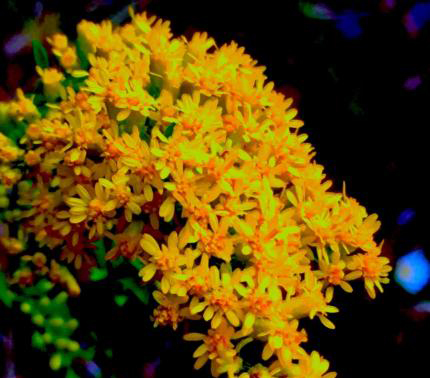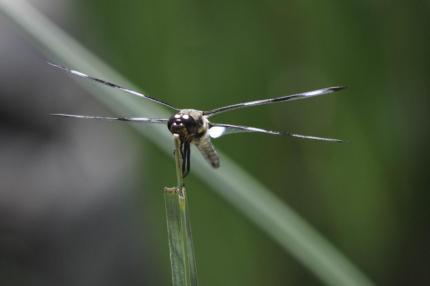
We recently held a retreat at Rolling Ridge, “Finding the Gold in the Darkness: The Way of Soul in Troubled Times,” led by Jim Hall and Cheryl Hellner. In preparation for the retreat we were asked to read an essay by Mary Evelyn Tucker, “Learning to Navigate Amid Loss.” The essay ended with an image about the necessity to find “a compass into the future.” This got me thinking, and that, together with elements from the retreat that followed, led to the reflection below.
A few days before the retreat began, I had returned to Rolling Ridge from more than a week away. The greens of the forest seemed thinner, translucent. The tips of the tupelo and dogwood leaves were delicately tinged ruby red. Goldenrod bloomed in the meadow. The breeze, while no cooler, carried a bright, crisp edge. The whole place seemed luminous and on the cusp of something momentous. Perhaps I was particularly tuned to these sensations because I was coming back from what had felt to me like a wasteland. Here everything is alive.
Because everything is alive, anything can happen. The landscape is vibrant and eludes mapping systems. We warn those coming on retreat about this, sending written directions with the admonition: “GPS is not reliable on our back roads.” Stories of being lost here are so plentiful they are nearly a genre. I have a friend who swears that at night the Rolling Ridge trees shake off the soil at their roots and move around: the path crossings and landmarks appear so entirely changed in the light of a new day. Anecdotes of being lost and found again in these woods are wonderfully entertaining. Every one of them is a metaphorical windfall.
But underneath the great storytelling and the gleaning of insight, the feeling of being lost is unsettling. Perhaps these days that unease is especially amplified because it taps into an anxiety that seems to ooze from everywhere. We feel institutions and ecosystems teetering and spinning around us, buffeted by forces over which we are powerless. The coordinates of all that we thought we knew have been irrevocably spun around and skewed. As Mary Evelyn Tucker describes it, “we are in a huge, historical whirlwind”.
The shifting coordinates of the outer world emit a magnetic charge that tugs at and unsettles our inner realms. Shamans, psychologists, storytellers, mythologists who study these things will tell you that the interior territories of our lives, where we swim in the joys and sorrows of the intimate, familial, exquisitely personal, and all that is exterior are invisibly and indelibly pulled together. When I push my three-year-old grandson on the playground swing, I feel the joy vibrate through his small body. Together we squeal in shared delight, but my voice has an edge of heartache. In that moment I also know the very particular rocky shoals that already menace his young life and the terrible possibility that a myriad of doors into intimacy with the green, good Earth and her family of beings, into imagination and wonder, may be closing shut forever around him. This is the grievous eye of the storm.
The question is how to live in this place, and more radically, how to thrive, or as the title of the retreat we just held put it, how to “find the gold in the darkness.” The marvelous thing about this question is that it has a thousand answers if we are willing to stand in the center of the whirlwind, brave the terrifying wind and the piercing heartbreak, and listen to the roar. Then it may be possible to hear other things, deeper sounds, just as vital and true: a melody of song, a line of poetry, a story, a call, the insistent request to step into the portentous, wild, luminous forest and pay attention. Which is what we did on this retreat.
The forest welcomed us. Box turtles, caterpillars, tulip poplars, black widows, stony creek beds, fallen trees, glistening webs, wind-blown branches wove a tapestry of presence around us. On Saturday evening we watched the full moon rise over the ridge, cool and silver, her face decorated with mysterious indigo shadows. We were bathed in amazement and moonlight.
Such immersion in splendor is essential grace and girding for the journey, because listening and wandering in this real and mythic forest is an act of openhearted courage. The inhabitants of the inner and outer lands in which we roam beckon us ever onward into more and more vulnerable and tender territory. Rilke advised: “Let everything happen to you: beauty and terror. Just keep going…”
This is mighty work, but the promise of the old stories, the bards, and all the rest of the wise ones is that if we take Rilke’s advice, and don’t flee or hide, the points of the compass will eventually come into view. We will locate our home in the community of everything, of all who are. We will navigate to soul ground. We will be the opposite of lost.
This just might be the necessary, revolutionary, daily soul-practice of our time.

The retreat ended on Sunday and later that day, as the afternoon mellowed, thousands of dragonflies, their dark and slender bodies supporting filigree wings, descended on the sheep field, the chicken yard, the garden, the entire ring of houses and outbuildings, as far as the eye could see. They circled and danced, swift and silent, moving in great arcs and tiny eddies, possibly for hours. No one remembered such a luminous, magical happening here ever before. Green darner dragonflies migrate south in the autumn, but a swarm in our area is astonishing. An animal ecologist at the University of Maryland told the Washington Post, “Climate warming could really disrupt the presence of this migration.”
Wonder blown here by cataclysm. Gold in the darkness.